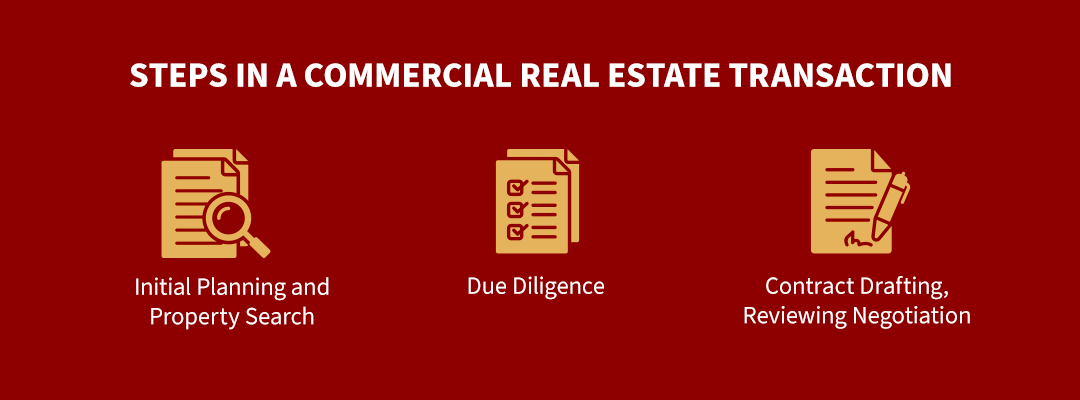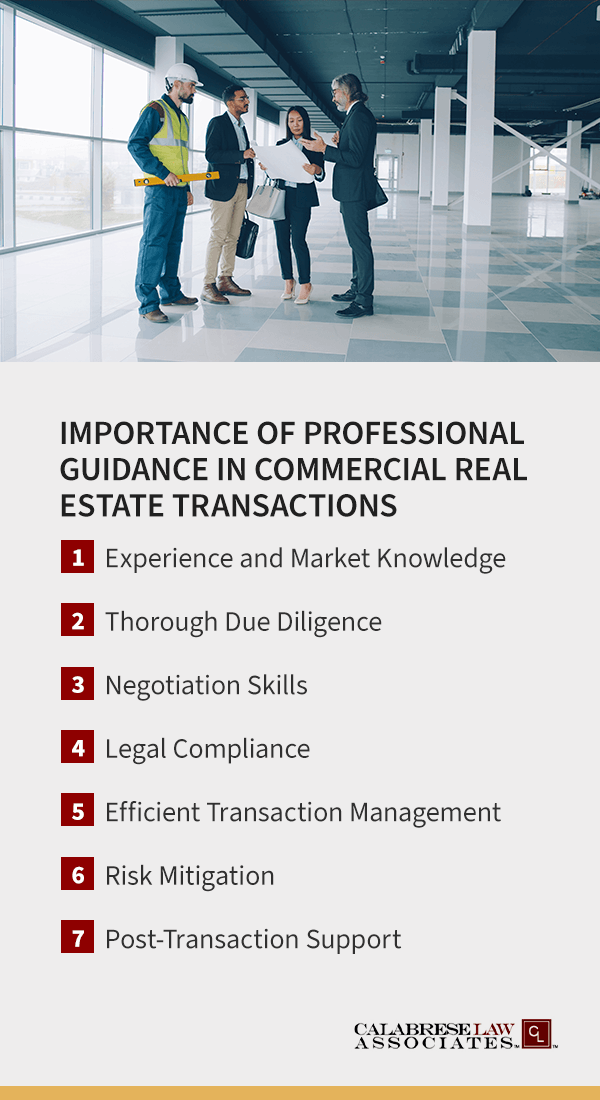In the dynamic world of commercial real estate, navigating the transaction with the proper insight is necessary. From the initial planning and property search to due diligence, contract negotiation, and closing, each stage plays a crucial role in the deal’s outcome. Learn the critical steps in a commercial real estate transaction and the importance of professional guidance. Join us as we dive into the intricacies and uncover strategies that drive success in today’s competitive market.
What Is a Commercial Real Estate Transaction?
A commercial real estate transaction involves buying, selling, or leasing properties used for business purposes. Examples of commercial properties include:
- Office buildings
- Retail spaces
- Industrial facilities
- Hotels
- Restaurants
- Multifamily properties, such as condominiums
Commercial real estate transactions are typically more complex than residential ones due to their size, number of parties, and financial demands. Also, the zoning and environmental protection requirements are usually stricter. Thus, getting an attorney with experience in the real estate industry can be very helpful.
The key considerations when engaging in commercial real estate transactions include:
- Property identification
- Negotiation
- Due diligence
- Financing
- Regulatory demands
- Closing
- Property management
Conducting proper commercial property transactions has many benefits, such as:
- Risk management: Proper commercial property transactions help reduce risks, costly mistakes, and legal issues.
- Asset value: Strategic acquisitions have financial benefits. Issue-free property can grow in value more quickly than one with legal problems.
- Legal compliance: Conducting due diligence in commercial property transactions ensures adherence to laws and contractual obligations, reducing the risk of legal disputes and penalties.
- Negotiation advantage: Understanding the nitty-gritty of commercial property transactions can give you a competitive advantage and allow you to secure favorable terms and pricing.
- Professional reputation: Demonstrating knowledge in commercial property transactions can enhance your reputation in the industry. A good reputation can increase opportunities for future deals and partnerships.
Who Are the Key Players Involved?
Several entities are involved in commercial property transactions, each playing an instrumental role. Here are six key participants:
- Real estate investors: These are individuals or entities that purchase commercial properties as investments. This helps them generate income and achieve capital appreciation. Real estate investors provide the capital needed to acquire the properties and often have specific objectives.
- Commercial lenders: They finance commercial real estate transactions by offering loans to property buyers and developers. Lenders could be banks, credit unions, private equity firms, or high-net-worth individuals. Generally, they evaluate the borrower’s creditworthiness, secure the loan terms, and manage the underwriting process.
- Property developers: They are responsible for acquiring land, obtaining the necessary approvals, and designing and constructing commercial buildings. Once completed, they bring the property to the market. Property developers help shape the physical landscape of cities and towns through new construction projects.
- Commercial real estate brokers: Brokers or agents act as intermediaries between buyers, sellers, landlords, and tenants in commercial property transactions. They help clients find suitable properties and sometimes negotiate and facilitate the transaction. Brokers provide market expertise, access to listings, and valuable insights to clients.
- Property management companies: They oversee the day-to-day operations of commercial properties on behalf of owners. Their duties may include tenant relations, maintenance and repairs, collecting rent and fees, and returning security deposits. Property managers may also enforce leases and prepare financial reports.
- Real estate attorneys: Attorneys play diverse roles in commercial property transactions. They draft, review, and negotiate contracts; conduct due diligence; and help resolve disputes. They handle legal issues before, during, and after the process.
Steps in a Commercial Real Estate Transaction
The commercial real estate transaction process varies depending on the situation. However, they can be categorized into three general steps. These are the initial planning, due diligence, and contracting stages. The best practice is to create a checklist containing the relevant factors:
1. Initial Planning and Property Search
The first stage in commercial property acquisition involves initial planning and research. During this phase, investors define their investment goals, such as:
- The desired property type
- Location
- Budget
- Expected returns
Market research is essential to understanding local market trends, supply and demand, and potential risks. It is also crucial to conduct a property search. The focus here is identifying suitable properties that align with your investment criteria. You may obtain information through various channels, such as online listings, real estate agencies, and networking within the industry.
2. Due Diligence
Due diligence is the process of investigating or verifying facts to mitigate risks and help you make informed decisions. There are different types, each serving a unique purpose. These include:
- Legal due diligence: This involves investigating the legal aspects of the transaction. Areas of consideration are title searches, ownership interests, regulatory compliance, contractual obligations, and pending or potential claims.
- Commercial due diligence: This focuses on the commercial aspects of the transaction. Examples of things to consider include potential competitors and market prospects.
- Financial due diligence: Similar to commercial due diligence, this type focuses on financial performance. The process involves reviewing income statements, expenses, and rent rolls.
- Structural due diligence: This is a complete property inspection. The purpose is to identify structural issues or needed repairs and estimate maintenance costs.
Each type may also involve various steps, so it is essential to seek professional assistance.
3. Contract Drafting, Reviewing Negotiation
Negotiation begins once you have identified the desired property and commenced due diligence. This stage is where you discuss the key terms of the deal, including:
- Price
- Financing terms
- Warranties
- Closing timeline
Generally, agreements involving real estate properties must be in writing, and it is usually the seller’s duty to draft the contract. However, it is also vital to review the deed and other documents to protect your interests. Real estate attorneys are instrumental at this stage. They help ensure the terms are fair and address legal concerns that arise.
The Closing Process
Closing is the final stage in commercial real estate transactions. This phase can be categorized into closing preparation and the closing day:
1. Preparing for Closing
During closing preparation, ensure financing is in place and all funding requirements are met. You must coordinate with lenders to secure the necessary funding, check that the lending documents are in order, and meet lender conditions for closing. You should also address regulatory requirements, such as obtaining permits and complying with zoning regulations. Complete your due diligence and outstanding issues to pave the way for a smooth closing.
2. Closing Day
On the closing day, parties will usually review the final details with real estate attorneys’ assistance. Parties will sign or exchange the relevant documents, such as:
- Deed
- Bill of sale
- Lease agreement
- Financing documents
- Title insurance policies
Parties may also pay outstanding amounts, including down payments, closing costs, and escrow amounts. After that, the seller must transfer ownership to the buyer. The attorney will record the transaction with the Register of Deeds office or the Massachusetts Land Court, depending on the property, to update the property’s ownership records.
Preparing Lease Agreements
After completing the transaction, you may want to lease the property to interested persons. There are different types of lease agreements for commercial properties, including:
- Gross leases: In this arrangement, the tenant makes a fixed monthly payment to the landlord. The fee covers rent and operating costs like maintenance, utilities, property insurance, and taxes. The specifics vary from contract to contract.
- Net leases: The monthly payment is less, but the tenant pays additional expenses. For example, the landlord may require the tenant to pay for property insurance, taxes, or maintenance. A triple net lease means tenants are responsible for all three. Single and double net leases also exist.
- Percentage leases: These are based on sale revenue. In other words, the tenant agrees to pay a percentage of its gross sales in addition to the base rent. Parties may also tie the rent to the cost of living in the area to cater to inflation.
There are no one-size-fits-all commercial leases, but some terms are standard. These include:
- Lease term duration with renewal options
- Rent amount
- Escalation clauses
- Maintenance responsibilities
- Improvements or alterations
- Default clauses
While the lease agreement may contain boilerplate clauses, it is common for landlords to customize the provisions.
Factors That Influence the Commercial Property Transaction Timeline
Several factors influence the commercial real estate transaction timeline. These factors may affect different stages of the process, and being aware of the potential roadblocks can help you develop solutions. Here are things to consider:
- Market conditions: Fluctuations in the real estate market, such as supply and demand dynamics, can impact the timeline. Transactions often move faster in competitive markets with high demand, whereas deals may take longer to finalize in slower markets.
- Property and transaction complexity: The complexity of the property or transaction, like its size, permitted use, or presence of multiple parties with varying interests, can influence the timeline. These factors may impact the duration of due diligence, structural corrections, and approvals.
- Financial challenges: Financing in commercial real estate transactions sometimes delays the process. If the amount to be lent is substantial, lenders may require additional documentation or appraisals before proceeding. The underwriting process can stall the transaction for a considerable duration.
- Legal and regulatory complications: Legal issues such as disputes, zoning restrictions, or environmental concerns can cause delays. Resolving these issues may require additional time and resources, but it is necessary to mitigate legal risks.
- Due diligence requirements: Thorough due diligence often takes a reasonable amount of time. Due diligence can be delayed if incomplete documents are submitted or if one party does not act promptly or in good faith.
- Negotiation process: Negotiations can stall when parties cannot agree on some issues. In such situations, it could be best to hire an attorney to help develop practical strategies. Most real estate lawyers have experience resolving complex issues.
Importance of Professional Guidance in Commercial Real Estate Transactions
Commercial real estate transactions are inherently complex. They involve significant financial investments, legal intricacies, and detailed due diligence processes. Professional guidance ensures all aspects of the deal are well-handled, protecting the interests of parties:
1. Experience and Market Knowledge
Real estate attorneys, brokers, and financial advisers bring a wealth of experience. Attorneys provide critical legal services, ensuring contracts are sound, rights are protected, and regulatory compliance is maintained. Real estate brokers have in-depth knowledge of market trends, property value, and potential investment opportunities. Financial advisers assist in evaluating the transaction’s financial viability and guide financing options and investment strategies. These capabilities can help you make informed decisions.
2. Thorough Due Diligence
The essence of due diligence cannot be overstated. It helps you identify potential risks or issues associated with the property. However, the process is usually complicated. Professionals can conduct detailed investigations to assess whether the deal is a good investment. They have the knowledge and resources to handle complex matters, taking the load off your shoulders. Partnering with the right person can help you prevent costly surprises after closing. It provides a clear understanding of the property’s value and potential liabilities.
3. Negotiation Skills
Negotiation requires skills and experience, especially in commercial real estate transactions. Real estate attorneys are adept at bargaining favorable terms, whether it involves the lease agreement, purchase price, financing terms, or contingencies. They can help you secure the best possible deal while protecting your interest. Real estate attorneys can also facilitate communication between parties, helping to resolve disputes or disagreements that may arise during negotiation.
4. Legal Compliance
Ensuring legal compliance is paramount in commercial real estate transactions. Real estate attorneys can navigate the complex web of local, state, and federal regulations governing the transaction. They can conduct title searches to verify ownership and identify liens or encumbrances on the property. Attorneys also review zoning laws and land use regulations to ensure the property’s intended use is permissible. These services help avoid legal pitfalls that could jeopardize the transaction or lead to future litigation.
5. Efficient Transaction Management
Managing a commercial real estate transaction involves coordinating multiple parties and processes. From initial planning to closing, professional guidance ensures that each step is handled effectively. Attorneys oversee legal processes, while brokers provide listings and assist with marketing efforts. Financial advisors help gauge the investment’s profitability and ensure funds are available during closing. This coordinated approach streamlines the transaction. It reduces delays and minimizes the risk of errors.
6. Risk Mitigation
Commercial real estate transactions sometimes carry risks like legal liabilities, financial exposure, and market fluctuations. Professionals help mitigate these risks by advising and implementing safeguards throughout the process. For example, they may recommend obtaining title insurance to protect against unforeseen title issues.
7. Post-Transaction Support
Professional guidance extends beyond closing. You may need ongoing support, such as drafting lease agreements and settling disputes. Real estate attorneys ensure all subsequent transactions are duly executed, protecting your investment. The most important thing is choosing a professional with a good track record. The ideal partner cares about your business’s growth and understands your industry.
Why Trust Us?
Calabrese Law Associates provides legal services to real estate investors in Massachusetts. We have years of experience assisting individuals and entities with complex matters. Our trusted attorneys provide helpful solutions through consulting services, contract drafting and review, negotiation, and legal due diligence.
Our core principles include delivering excellent legal services, maintaining outstanding relations with our clients, and ensuring results are tailored to their needs. Our goal is to provide effective solutions through a friendly and collaborative partnership. We are transparent in all our dealings and implement ethical and practical strategies.
Calabrese Law Associates has won several awards in the Greater Boston Area. We have strong ties with the community and pride ourselves on being a true local law firm. Our world-class legal team leverages extensive industry knowledge to help clients gain a competitive advantage. View our reviews and testimonials to learn more.
Contact a Commercial Real Estate Attorney Today
The commercial real estate attorneys at Calabrese Law Associates will listen attentively and guide you throughout the transaction. Our trained and well-resourced team has handled complex matters and is ready to assist. Contact us now if you are purchasing or selling a property and need support from beginning to end. We are available to answer all your questions.
This publication and its contents are not to be construed as legal advice nor a recommendation to you as to how to proceed. Please consult with a local licensed attorney directly before taking any action that could have legal consequences. This publication and its content do not create an attorney-client relationship and are being provided for general informational purposes only.
Attorney Advertising. Prior results do not guarantee a similar outcome.







